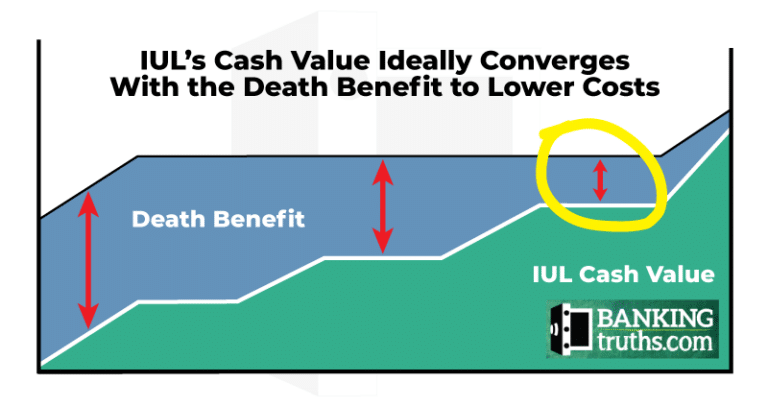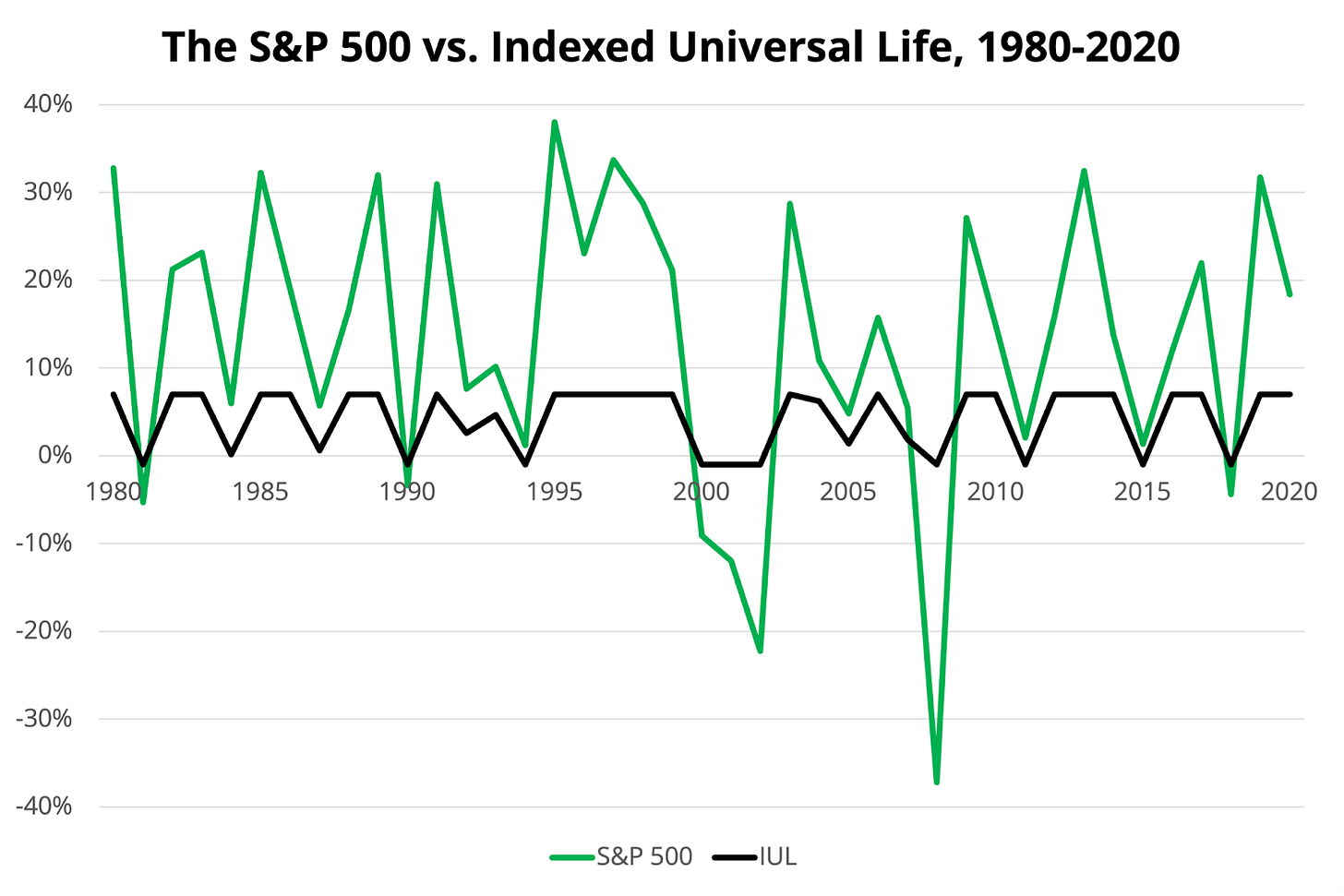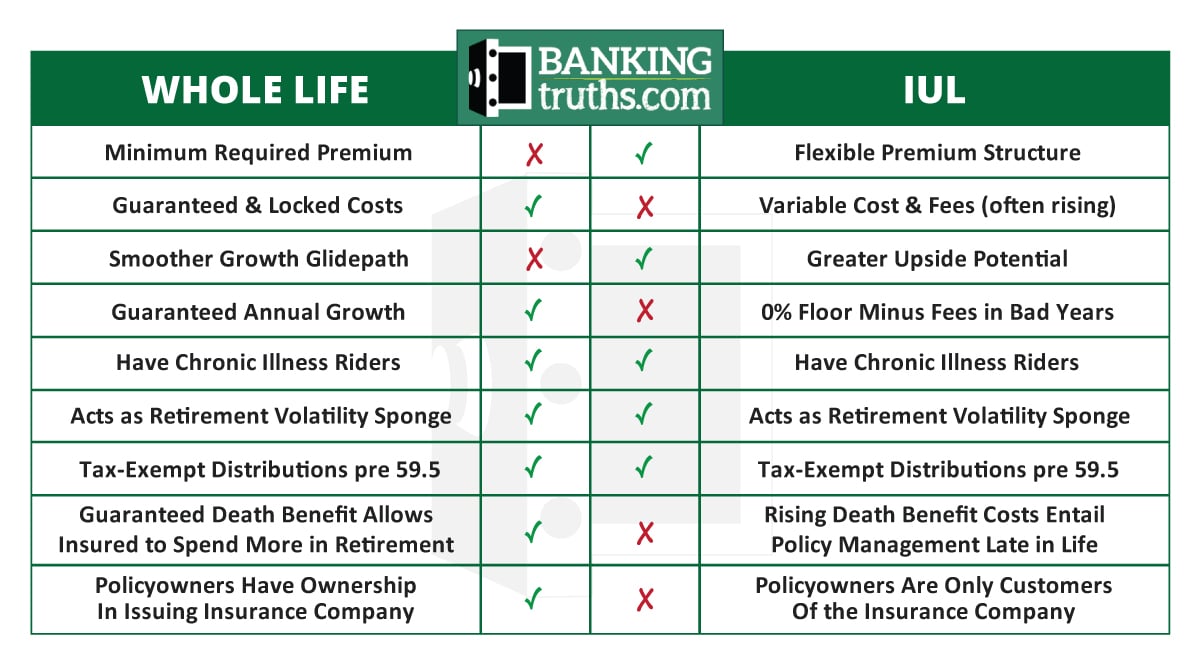All Categories
Featured
Table of Contents
1), commonly in an attempt to defeat their group averages. This is a straw male disagreement, and one IUL folks enjoy to make. Do they contrast the IUL to something like the Lead Overall Stock Exchange Fund Admiral Show to no load, a cost ratio (ER) of 5 basis points, a turnover proportion of 4.3%, and an outstanding tax-efficient record of distributions? No, they compare it to some terrible actively taken care of fund with an 8% tons, a 2% ER, an 80% turn over ratio, and a terrible document of temporary capital gain circulations.
Mutual funds typically make yearly taxed distributions to fund proprietors, even when the value of their fund has gone down in worth. Shared funds not just need revenue reporting (and the resulting yearly tax) when the common fund is going up in value, but can likewise enforce income tax obligations in a year when the fund has dropped in worth.
That's not just how mutual funds function. You can tax-manage the fund, gathering losses and gains in order to lessen taxed distributions to the investors, but that isn't somehow going to change the reported return of the fund. Only Bernie Madoff types can do that. IULs avoid myriad tax catches. The ownership of common funds may require the mutual fund proprietor to pay projected tax obligations.

IULs are very easy to position to ensure that, at the owner's fatality, the recipient is exempt to either revenue or inheritance tax. The exact same tax reduction strategies do not function nearly also with shared funds. There are countless, commonly pricey, tax obligation catches associated with the timed purchasing and marketing of common fund shares, catches that do not relate to indexed life Insurance.
Possibilities aren't really high that you're mosting likely to undergo the AMT as a result of your common fund distributions if you aren't without them. The remainder of this one is half-truths at best. For example, while it holds true that there is no income tax as a result of your successors when they inherit the earnings of your IUL plan, it is also real that there is no income tax due to your beneficiaries when they acquire a mutual fund in a taxable account from you.
Insurance Indexation
The federal inheritance tax exception limit mores than $10 Million for a pair, and growing every year with inflation. It's a non-issue for the substantial bulk of medical professionals, a lot less the remainder of America. There are far better methods to prevent estate tax obligation issues than buying financial investments with low returns. Shared funds may cause income tax of Social Safety benefits.

The development within the IUL is tax-deferred and may be taken as free of tax revenue via car loans. The plan proprietor (vs. the shared fund manager) is in control of his/her reportable earnings, thus enabling them to reduce and even get rid of the taxation of their Social Security advantages. This one is great.
Here's an additional marginal problem. It's true if you get a common fund for say $10 per share right before the circulation day, and it disperses a $0.50 circulation, you are after that going to owe taxes (most likely 7-10 cents per share) despite the truth that you have not yet had any kind of gains.
In the end, it's really concerning the after-tax return, not exactly how much you pay in tax obligations. You're also probably going to have even more money after paying those tax obligations. The record-keeping demands for owning mutual funds are significantly a lot more complicated.
With an IUL, one's documents are maintained by the insurance policy business, copies of yearly statements are mailed to the owner, and circulations (if any) are completed and reported at year end. This one is additionally sort of silly. Naturally you must keep your tax records in case of an audit.
Iul Agent Near Me
All you have to do is shove the paper right into your tax folder when it shows up in the mail. Rarely a reason to get life insurance policy. It resembles this person has never bought a taxed account or something. Shared funds are commonly part of a decedent's probated estate.
Additionally, they go through the hold-ups and expenditures of probate. The earnings of the IUL plan, on the other hand, is always a non-probate circulation that passes beyond probate directly to one's named beneficiaries, and is therefore not subject to one's posthumous lenders, undesirable public disclosure, or similar hold-ups and prices.
We covered this set under # 7, but simply to wrap up, if you have a taxed mutual fund account, you must put it in a revocable trust fund (or even easier, make use of the Transfer on Death designation) to avoid probate. Medicaid disqualification and lifetime revenue. An IUL can supply their proprietors with a stream of income for their whole life time, despite exactly how lengthy they live.

This is beneficial when arranging one's events, and converting possessions to earnings prior to an assisted living facility confinement. Mutual funds can not be transformed in a similar fashion, and are practically always taken into consideration countable Medicaid possessions. This is another foolish one promoting that poor people (you recognize, the ones that require Medicaid, a federal government program for the bad, to pay for their retirement home) should make use of IUL rather of shared funds.
Iul Vs 401k Calculator
And life insurance looks horrible when contrasted fairly against a retired life account. Second, people who have money to purchase IUL above and beyond their pension are going to need to be horrible at managing money in order to ever before receive Medicaid to spend for their assisted living facility prices.
Chronic and terminal ailment biker. All plans will certainly allow an owner's simple accessibility to cash from their policy, often waiving any abandonment fines when such people suffer a serious illness, require at-home treatment, or come to be restricted to an assisted living facility. Shared funds do not offer a similar waiver when contingent deferred sales charges still relate to a common fund account whose owner requires to offer some shares to money the prices of such a keep.
Index Universal Life Vs 401k
You get to pay more for that benefit (cyclist) with an insurance plan. Indexed universal life insurance coverage supplies fatality benefits to the beneficiaries of the IUL owners, and neither the owner nor the beneficiary can ever before lose cash due to a down market.
Now, ask on your own, do you actually require or want a survivor benefit? I definitely do not need one after I reach monetary independence. Do I desire one? I intend if it were inexpensive enough. Obviously, it isn't low-cost. On standard, a buyer of life insurance policy spends for the real price of the life insurance policy benefit, plus the expenses of the plan, plus the earnings of the insurance provider.
Indexed Universal Life Leads
I'm not entirely certain why Mr. Morais threw in the entire "you can't lose cash" once more right here as it was covered quite well in # 1. He simply desired to duplicate the most effective marketing factor for these things I intend. Again, you do not lose nominal dollars, but you can shed actual dollars, in addition to face serious chance expense because of low returns.

An indexed global life insurance coverage policy owner might exchange their plan for a totally various policy without causing revenue tax obligations. A mutual fund owner can not relocate funds from one mutual fund firm to another without marketing his shares at the previous (hence activating a taxed occasion), and repurchasing brand-new shares at the latter, frequently subject to sales charges at both.
While it holds true that you can trade one insurance policy for one more, the reason that people do this is that the initial one is such a horrible policy that also after getting a brand-new one and going via the early, negative return years, you'll still come out ahead. If they were marketed the best policy the first time, they should not have any type of desire to ever exchange it and experience the very early, unfavorable return years once more.
Latest Posts
Minnesota Life Iul
Group Universal Life Cash Accumulation Fund
What Is Indexed Whole Life Insurance